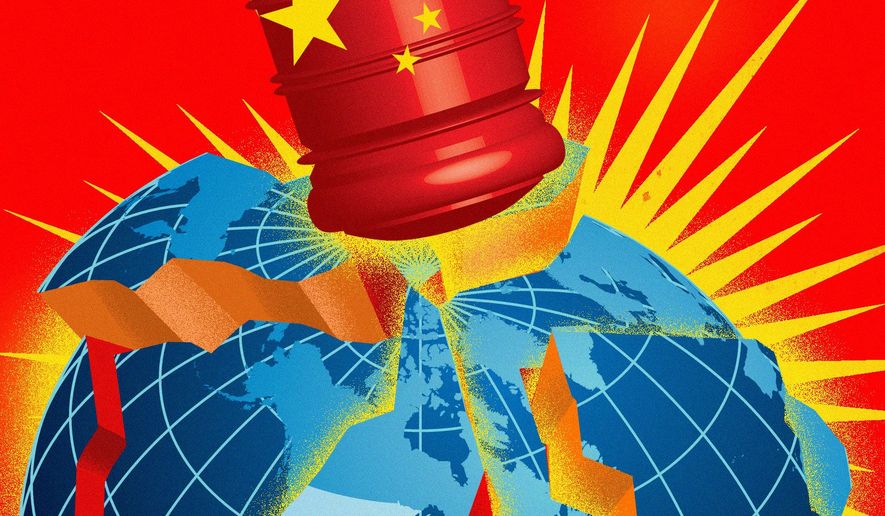OPINION:
Top officials of the Biden administration met in Anchorage this month with top officials of the People’s Republic of China (PRC). Reporters characterized their exchange as an “ugly verbal spat,” “an exchange of insults” and “an unusually undiplomatic sparring match.”
But if you listen closely, you’ll comprehend that something more significant and alarming is happening: China’s Communist rulers are making clear that they intend to wrest the torch of global leadership from America’s hands.
In his opening remarks, Secretary of State Antony Blinken declared that the goal of the Biden administration is “to strengthen the rules-based international order” — shorthand for the global institutions, laws, values and norms established by the U.S. and its allies following World War II.
“The alternative to a rules-based order,” he argued, “is a world in which might makes right and winners take all, and that would be a far more violent and unstable world for all of us.”
The United States, he said, wants the PRC to be a good and respected member of the rules-based order. For that reason, he expressed “deep concerns” about Beijing’s brutal repression of China’s ethnic and religious minorities, its egregious violations of its treaty obligations vis-a-vis Hong Kong, its menacing of Taiwan, and its “cyberattacks on the United States, economic coercion toward our allies.”
He added: “Each of these actions threaten the rules-based order that maintains global stability. That’s why they’re not merely internal matters, and why we feel an obligation to raise these issues here today.”
Foreign Minister Wang Yi brusquely dismissed the charges. And then he went further — rejecting the rules-based order as Americans define it.
“What China and the international community follow or uphold is the United Nations-centered international system and the international order underpinned by international law, not what is advocated by a small number of countries of the so-called rules-based international order,” he said.
He added that the “overwhelming majority of countries in this world do not recognize that the rules made by a small number of people would serve as the basis for the international order.”
His argument rests on the fact that Beijing, over recent years, has quietly grown into an 800-pound gorilla within the United Nations system. Chinese nationals run many of the most important international organizations where they act not as global civil servants but as Beijing’s apparatchiks.
At other bodies, the World Health Organization for example, those in charge, though not from China, take instructions from the Chinese Communist Party (CCP).
And because the PRC won election to the U.N. Human Rights Council last October, Mr. Wang could assert that most of the world doesn’t regard Beijing’s record on human rights as problematic.
Meanwhile, the International Criminal Court is on track to investigate the U.S. for war crimes in Afghanistan, while the PRC is not in the ICC’s crosshairs.
Yang Jiechi, the CCP’s top diplomat, added insult and injury. China’s Marxist/Leninist/Maoist political system — in which the CCP’s control of the citizenry is increasingly absolute — should be recognized as “Chinese-style democracy,” he demanded.
He compared that to “United States-style democracy,” chiding Mr. Blinken: “It is not just up to the American people, but also the people of the world, to evaluate how the United States has done in advancing its own democracy.”
Mr. Wang couldn’t wait to rub salt into that wound: “Many people within the United States actually have little confidence in the democracy of the United States.”
Is he wrong? Americans on the far-left, not least within Mr. Biden’s own party, now charge that the United States is “systemically racist,” a cesspool of “White supremacy,” and teeming with “social injustice.” Invoking the authority of the Black Lives Matter movement, Mr. Wang charged that Black Americans are being “slaughtered.”
While refraining from offering persecuted Americans of color asylum in Xinjiang or Tibet, he added with faux empathy: “We hope the United States will do better on human rights.”
Mr. Blinken responded as best he could, acknowledging that Americans are “not perfect, we make mistakes, we have reversals, we take steps back,” but that the nation’s “secret sauce” is its ability to “look hard at its own shortcomings,” implying that China’s rulers should do the same. Trust me: They were not persuaded.
Subsequent, private conversations between the diplomats were described as “constructive,” but when the Anchorage meeting ended, there were no joint statements expressing areas of agreement, cooperation or even mutual concern.
If nothing was achieved, is it possible that something was learned? For decades, Western foreign policy elites convinced themselves that if we helped China become prosperous, its rulers would become moderate. Since that’s not how things worked out, policy adjustments are required.
Perhaps, too, Mr. Blinken now sees the extent to which the U.N., its affiliated organizations and the international order in general are being transformed into Beijing’s assets, with Americans paying the lion’s share of the bills. To prevent the U.S. position from deteriorating further, will require a strategy. The Biden administration doesn’t have one yet.
In the contest for global leadership, China’s rulers enjoy a distinct advantage: They’re hungry for power. By contrast, many Americans, on both the left and the right, have grown tired of shouldering the burdens that attach to being No. 1. They’d like someone else to take a turn. At present, unfortunately, there’s only one viable candidate.
It’s often said that the Cold War ended with the defeat of Communism. In truth, it ended only with the collapse of the Soviet Union. Future generations of Americans will be ill-served if we leave them a world in which the CCP is the international hegemon making rules for a new and distinctly unfree world order.
• Clifford D. May is founder and president of the Foundation for Defense of Democracies (FDD) and a columnist for The Washington Times.




Please read our comment policy before commenting.